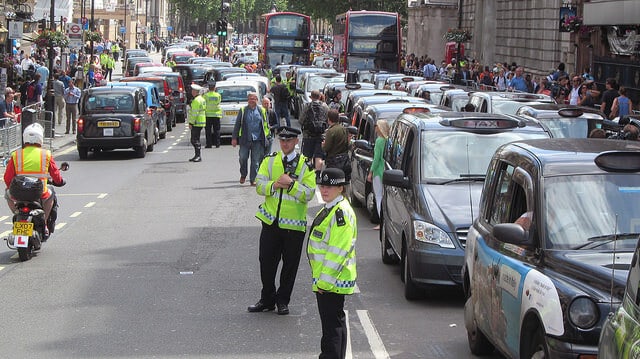 A few weeks ago GoTaxi reported on a protest outside The Shard where hundreds of taxi drivers voiced their anger at the fact that there is no dedicated taxi rank outside the building. During the demonstration, taxi drivers also protested against the new ‘Uber’ App which allows customers to book a taxi using their mobile phone. London taxi drivers are claiming that not only is this App stealing their business but that drivers who use it are breaking the law as the App calculates each fare – something that public hire taxi drivers are claiming is against the law.
A few weeks ago GoTaxi reported on a protest outside The Shard where hundreds of taxi drivers voiced their anger at the fact that there is no dedicated taxi rank outside the building. During the demonstration, taxi drivers also protested against the new ‘Uber’ App which allows customers to book a taxi using their mobile phone. London taxi drivers are claiming that not only is this App stealing their business but that drivers who use it are breaking the law as the App calculates each fare – something that public hire taxi drivers are claiming is against the law.
However, it has been claimed that as the technology which calculates drivers’ fares is not technically installed in their vehicle as with most public hire taxis, Uber is not breaking the law. On Wednesday 11th June almost twelve thousand taxi drivers took part in a ‘go-slow’ demonstration in order to protest against Transport for London (TfL) not banning the App, however it looks like this plan may have backfired. With no public hire taxis available on London’s roads, Uber saw an 850% increase in new users trying to get home while the demonstration took place.
Before the demonstration took place, Garrett Emmerson, Transport for London’s chief operating officer for surface transport, said: “A number of taxi drivers are set to cause pointless disruption for Londoners over a legal issue that is down to the courts to decide upon. TfL will work with the Metropolitan Police to do all we can to keep central London moving. However, given the scale of the likely disruption, we would advise drivers to avoid the area if at all possible.”
Uber’s UK and Ireland general manager Jo Bertram also responded to the demonstration and said: “Our technology allows us to identify areas where demand is high and we’ll be helping Londoners to get around town quickly and efficiently. There’s room for black cabs and private hire cars to co-exist in London and we want to be part of a healthy, vibrant and diverse market. Londoners are voting with their fingers, tapping the app in support of new and innovative services as we see our biggest day of sign-ups in London today since launch two years ago.
“In fact, today we’re seeing an 850 per cent increase in sign-ups compared to last Wednesday. The results are clear: London wants Uber in a big way. We passed TfL’s most stringent and comprehensive audit of a Private Hire Vehicle operator to date, passing with flying colours. We are proud to be to be in London, we are proud to serve London, and we are here to stay.” The Institute of Directors also supported the use of Uber in London, with director general Simon Walker adding: “Black cabs have been a symbol of London for many decades, known across the world.
“But symbols, no matter how iconic, cannot be allowed to stand in the way of innovation. Uber and its rival apps are an example of the positive disruption new technology brings, offering consumers new choices about how to travel. The battle over taxi apps gets to the heart of what creative destruction means. As a nation, we have to decide whether we want to open ourselves up to more choice and competition, or protect existing industries at the expense of consumers.”
However, Ian Beetlestone from the Rail and Maritime Transport union (RMT) said: “We are not objecting to competition. We have had competition for years from minicabs but we haven’t caused gridlock over it. We have to jump through hoops to be regulated and we don’t feel people involved in these new apps are being subjected to the same regulations.” Meanwhile, Steve McNamara, of the Licensed Taxi Drivers’ Association (LTDA) said: “We have nothing against competition but we feel that Transport for London has failed Londoners by allowing Uber to operate outside the law.”
By allowing Uber to operate outside the law, London taxi drivers are claiming that passengers are being put in danger and drivers do not have valid taxi insurance policies to protect them should they be involved in an accident while on the road. Furthermore, they claim that one of the reasons that Uber is getting away with not adhering to current private hire taxi regulations is because they are backed by a number of large American corporations and are worth billions of dollars.
Photo by David Holt / CC BY-SA 2.0
